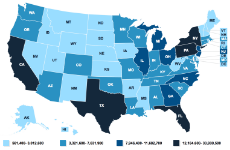The Department of Commerce has announced that it will include a question about citizenship on the 2020 U.S. Census.
>After a thorough review of the legal, program, and policy considerations, as well as numerous discussions with Census Bureau leadership, Members of Congress, and interested stakeholders, Secretary Ross has determined that reinstatement of a citizenship question on the 2020 decennial census questionnaire is necessary to provide complete and accurate census block level data.
http://archive.is/bKJCP
If Congress were then to act and shift congressional apportionment to be distributed among states in terms of the number of citizens rather than the total population, this would massively shift power away from states with massive illegal immigrant populations (Democrat states) and towards states with more citizens, causing blue and purple states to lose representatives in the House of Representatives and the Electoral College, and red states to gain representatives.
>For example, California has an estimated three million illegal aliens, a total of about 5.3 million noncitizens, and a total population of about 39.5 million residents. Currently, California has 53 congressional seats, the most in the country. If California’s congressional districts were set by the number of citizens in the state, it would potentially lose three to five congressional seats, leaving the state with about 48 to 50 seats.
>Likewise, Florida — which has a noncitizen population of about 2.2 million people — would not gain any congressional seats if only citizens were counted. Under the current standards, they are expected to gain two seats.
>Currently, congressional districts are set by the total number of residents. Each district cannot have less than 711,000 unless they are the only district in the state, like Wyoming.
>If congressional districts were set by the number of citizens, the overall average population needed per congressional seat could decrease to about 670,000 citizens per district. This would give a stronger advantage for states with small illegal alien populations to gain and keep their current number of congressional seats.
>For instance, if by counting citizens, a state like Ohio with few illegal aliens, could possibly gain a congressional seat, increasing the state’s total number of representatives to 17. Current projections suggest Ohio will lose a congressional seat.
>In West Virginia, which is also slated to lose a congressional seat, the state could keep their three districts if the redistricting is counted by citizens.
>Indiana, as well, — with less than 180,000 noncitizen residents — would potentially increase its congressional seats from nine to ten if apportionment is based on the number of citizens in the state.
>The electoral power shift away from elite coastal metropolises and towards more rural, middle American regions — should Congress choose to apportion districts based on citizens — would be one of the Trump administration’s most prominent immigration initiatives.
http://archive.is/QvDGg
Naturally, Democrats are extremely opposed to the plan, with 12 states already preparing a lawsuit against the plan
>Twelve states have agreed to sign on to a lawsuit which seeks to block a question about citizenship being asked on the 2020 Census, stating that the query violates the Constitution, which mandates that all residents of the U.S. must be counted, regardless of immigration status.
>New York state Attorney General Eric Schneiderman said March 27 he would lead a multistate lawsuit to block the decision. Separately, the state of California filed a lawsuit March 27 with the District Court of Northern California (see earlier India-West story: https://bit.ly/2E2YhSs).
>New Jersey state Attorney General Gurbir Grewal, who is Indian American, announced March 27 that his state would join Schneiderman’s lawsuit. “Notwithstanding the Administration’s rhetoric, we don’t need a citizenship question on the 2020 Census. And the reality is that such a question would only do harm,” said Grewal.
>"Particularly in the current national climate, a citizenship question will obviously cause great consternation and discourage participation in the Census. That lack of participation will inevitably have far-reaching, negative effects – particularly in New Jersey, where we have the third largest percentage of immigrants in the country,” said Grewal, the first Sikh American attorney general in the nation.
>The announcement has unleashed a volley of ire in the immigrant community, which believes that asking about citizenship will discourage minority communities from participating, leading to a huge undercount.
http://archive.is/ZdbMm
\r
/mlpol/ - My Little Politics
Archived thread
1522431753.jpg (79.9 KB, 880x595, 5C3062C5-4A2F-40E6-A706-3F92B5343C1F.jpeg)

Oh, you are not a citizen but want to have a say in our elections? Well sure. Just say that you’re not a citizen on the form and one of our friendly people will be by to collect you shortly.
Mobilefagging so I can't give a more in depth post, but here's the gist.
>Illegals are criminals, this is a simple fact not an oppinion.
>People choosing to not participate in the census are also criminal
>It doesn't matter if you feel like following the laws of the land when the law is in this case, in fact, just.
>democrats don't understand the Constitution and never have
>Democrats want to repeal rights and break the Constitution on a daily basis but at the same time use it as a sheild for their rhetoric
>democrats weild the law like a sword while they themselves ignore it, case and point illegals are not citizens
>Sactuary cities and states are unconstitutional in the most basic of forms
>Federal power supersedes state power as decided by the civil war they so easily explain as a war of slavery that THEY THEMSELVES started and lost.
>Adding a question doesn't mean they don't take the census so thier argument is bullshit, not even bullshit. It's horseshit.
I've got more but I'm at work looking at a Nazi pony board instead of building a customers computer and I don't want to waste more of my employers time.
>Illegals are criminals, this is a simple fact not an oppinion.
>People choosing to not participate in the census are also criminal
>It doesn't matter if you feel like following the laws of the land when the law is in this case, in fact, just.
>democrats don't understand the Constitution and never have
>Democrats want to repeal rights and break the Constitution on a daily basis but at the same time use it as a sheild for their rhetoric
>democrats weild the law like a sword while they themselves ignore it, case and point illegals are not citizens
>Sactuary cities and states are unconstitutional in the most basic of forms
>Federal power supersedes state power as decided by the civil war they so easily explain as a war of slavery that THEY THEMSELVES started and lost.
>Adding a question doesn't mean they don't take the census so thier argument is bullshit, not even bullshit. It's horseshit.
I've got more but I'm at work looking at a Nazi pony board instead of building a customers computer and I don't want to waste more of my employers time.
now if only this was required when collecting any kind of welfare or applying for a job
>the reality is that such a question would only do harm
sure it would, to democrats and leftists.
They count on illegal aliens to participate in the election, because thats the only way the would be able to win.
So let me get this straight:
They are preparing a law suit to enable people that shouldnt even be able to live in the US, to vote because it would take away their power. Sorry, I meant because it "would hurt immigrants". How exactly would it hurt completely legal immigrants? Oh right, it doesnt.
The greatest of logics has been used in that argumentation.
sure it would, to democrats and leftists.
They count on illegal aliens to participate in the election, because thats the only way the would be able to win.
So let me get this straight:
They are preparing a law suit to enable people that shouldnt even be able to live in the US, to vote because it would take away their power. Sorry, I meant because it "would hurt immigrants". How exactly would it hurt completely legal immigrants? Oh right, it doesnt.
The greatest of logics has been used in that argumentation.
>New York state Attorney General Eric Schneiderman said March 27 he would lead a multistate lawsuit to block the decision.
>Schneiderman
At this point, he might as well be named Schlomo Goldbergstein. I swear, these (((names))) are becoming less and less subtle.
>Schneiderman
At this point, he might as well be named Schlomo Goldbergstein. I swear, these (((names))) are becoming less and less subtle.
>>134559
"people are blatantly breaking the law but don't be mean to them about it"
I'll never understand this weird attitude they have
>>134569
>"german"
https://en.wikipedia.org/wiki/Eric_Schneiderman
>Schneiderman was born to a Jewish family in New York City; he is the son of Abigail Heyward and Irwin Schneiderman, a lawyer.
get out (((shill)))
"people are blatantly breaking the law but don't be mean to them about it"
I'll never understand this weird attitude they have
>>134569
>"german"
https://en.wikipedia.org/wiki/Eric_Schneiderman
>Schneiderman was born to a Jewish family in New York City; he is the son of Abigail Heyward and Irwin Schneiderman, a lawyer.
get out (((shill)))
I really hope they get to add the citizenship question on the census. I also hope they get Voter ID in place soon.
>If they manage to block the question is there a way for me to order some of the census forms so I can fill them out on behalf of states that would otherwise loose out?
>If they manage to block the question is there a way for me to order some of the census forms so I can fill them out on behalf of states that would otherwise loose out?
>>134570
>"The migrants we love because they aren't the citizens we loathe from this country we loathe are blatantly breaking this country's law but don't be mean to them about it because we want more lawbreakers and less of you"
Fixed. Liberals are cancer. Some realize it, some don't.
>"The migrants we love because they aren't the citizens we loathe from this country we loathe are blatantly breaking this country's law but don't be mean to them about it because we want more lawbreakers and less of you"
Fixed. Liberals are cancer. Some realize it, some don't.
This would buy us several more years at least if this manages to go through. You can bet Demoncrats will fight tooth and nail.
>>134554
>Adding a question doesn't mean they don't take the census so thier argument is bullshit, not even bullshit. It's horseshit.
It’s the same argument they make about voter IDs. There’s nothing unreasonable about it and they know it, so they go with an appeal to emotion instead. Illegals will be “afraid” to answer questions about citizenship so they won’t take the census, blacks will be “afraid” to show ID so they won’t vote. Completely speculative in both cases and totally irrelevant to the law.
>Adding a question doesn't mean they don't take the census so thier argument is bullshit, not even bullshit. It's horseshit.
It’s the same argument they make about voter IDs. There’s nothing unreasonable about it and they know it, so they go with an appeal to emotion instead. Illegals will be “afraid” to answer questions about citizenship so they won’t take the census, blacks will be “afraid” to show ID so they won’t vote. Completely speculative in both cases and totally irrelevant to the law.
17 replies | 6 files | 14 UUIDs | Archived





 Ex: Type :littlepip: to add Littlepip
Ex: Type :littlepip: to add Littlepip  Ex: Type :eqg-rarity: to add EqG Rarity
Ex: Type :eqg-rarity: to add EqG Rarity 